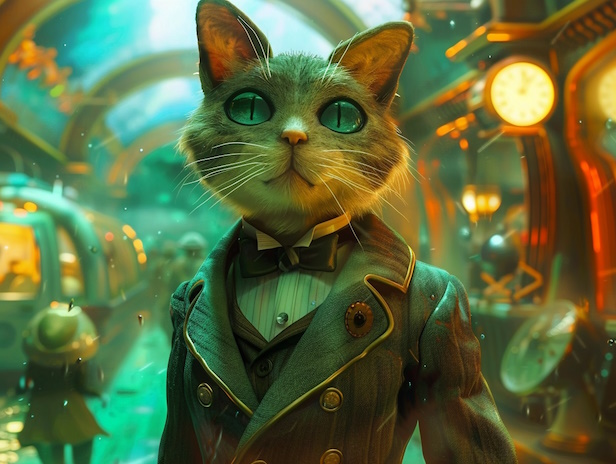I finally saw last year’s blockbuster, Oppenheimer. Let’s just say that my reaction to the film is not exactly in the mainstream.
That is, Best Picture my ass.
I am okay with Murphy’s Best Actor. Downey Jr. was especially good, earning his Best Supporting Actor in a role that I can only describe as unpleasant, playing the main villain of the Oppenheimer story, Lewis Strauss.

An actual photo of the real Oppenheimer
But the film?
For starters, there’s the jumbled timeline. I am deeply familiar with the Manhattan project, and reasonably familiar with Oppenheimer’s life, including the story of the humiliating revocation of his security clearance in the 1950s. Even so, I was confused: I had a hard time keeping track of what I was seeing.
Then, there are some of the portrayals. Teller was unrecognizable. Where was the famous limp? And what’s with the accent? Sometimes, no accent at all, sometimes an accent that, whatever it was, didn’t sound even remotely like Teller’s. For some of the other, well-known physicists, it was same thing: I’m glad the closed caption sometimes showed the name of the person talking, otherwise, I swear I would not have known that one of them was Szilard, for instance. And Groves? His portrayal by Matt Damon was more like a caricature than the real general.
And then there are the gratuitous sex scenes. I hope I don’t come across as a prude by mentioning this, but… was it really necessary? I mean, yes, I get it, their penetrating questions about Oppenheimer’s private life were metaphorically undressing him, but was it really necessary to assume that the audience is so dumb, they won’t “get it” unless you put Oppenheimer, stark naked, fucking his girlfriend right there in the chair in the conference room while he is being interrogated? Seriously, this was so over the top, I could not believe my eyes. My reaction was that they were trying to out-Kubrick Kubrick, but without the talent of Kubrick (and I am decidedly not a Kubrick fan.)
Then how about the conversations? Some of them, I swear, sounded like a bad AI (no, not GPT-4 or Claude 3, more like GPT-2 or compact versions of Llama) trying to recreate conversations between scientists. I don’t want to set an impossible standard here. How about just meeting the standard, say… of a sitcom? The Big Bang Theory and Young Sheldon are both more respectful of the science (and the intellectual quality of discussions between scientists) than this film.
And some of the scenes were just grossly inauthentic. Never mind misrepresenting the then-perceived significance of the Oppenheimer-Snyder paper on gravitational collapse (yes, it is significant, but no, the term “black hole” was not even coined until a quarter century later), what was that with that childish celebration when the print edition arrived? By then, Oppenheimer and his colleagues would have known for months that the paper was accepted. Oppenheimer would have seen, and corrected, the galley proofs. The fact that print copies of the journal would appear on the appointed date would have been neither a surprise nor news to anyone involved.
What about the things that were omitted from the film? And no, I am not talking about technical details, not even the massive role facilities other than Los Alamos played in the development of the bomb. How about Oppenheimer’s 1960 visit to Hiroshima? It could have offered some profound moments, perhaps even allowing the film to conclude in a way much more fitting than the stupid “burn the atmosphere” CGI.
And speaking of CGI… what’s with the Trinity explosion itself? I read somewhere that it was not CGI. I could tell… it felt cheap. A bit like the explosion of the planet Alderaan in the original Star Wars movie, before the remaster.
The film had some redeeming segments, especially in the final half hour, but even those were overplayed, like that final (as far as I know, wholly fictitious) conversation between Oppenheimer and Einstein. Certainly not enough to salvage the movie for me. The best part were the end credits, as the music score was decent (not sure about Best Original Score quality, but it was enjoyable).
All in all, between the two acclaimed blockbusters from last year, in my view, Barbie won hands down.
Incidentally, I reminded myself that I had an equally negative view of another famous blockbuster from ten years ago, Interstellar: crappy story, crappy science, a psychedelic scene that wanted to be a bit Kubrick-like but couldn’t quite make it (and I absolutely hated what Kubrick has done with the closing scenes of 2001: A Space Odyssey). What I didn’t realize until this moment is that both Interstellar and Oppenheimer were directed by the same Christopher Nolan. Guess that makes it official: I am no fan of Christopher Nolan! On the other hand, I suppose I am a fan of his younger brother: I liked Westworld, and I am beyond impressed by what he did with Fallout.



